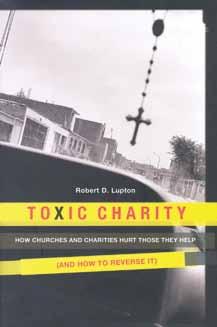
4 minute read
Reviews
We want to help ... so badly
Toxic Charity: How Churches and Charities Hurt Those They Help (And How to Re-
Advertisement
verse It). By Robert D. Lupton (HarperOne, 2011, 191 pp. $22.99 U.S. $24.99 Cdn.)
If you’ve ever gone on a mission trip to a developing country, you may want to take a deep breath before reading this book. The author, veteran urban minister Robert Lupton, takes a dim view of such trips, and thinks they should at least be renamed, if not abandoned.
His unsettling critique goes to the core of how good intentions can go awry. Missiontrippers typically have noble goals, but often they don’t help at all. Many mission trips are essentially make-work projects that displace local labor, distract local leaders from their work and leave little lasting impact — except in the hearts and travel journals of the affluent visitors.
Lupton says the lucrative mission trip industry last year engaged two to four million Americans who raised and spent billions of dollars. “But isn’t it time we admit to ourselves that mission trips are essentially for our benefit?” he writes. “Would it not be more forthright to call our junkets ‘insight trips’ or ‘exchange programs’? Religious tourism would have much more integrity if we simply admitted that we’re off to explore God’s amazing work in the world.”
Compassion is a great thing, says Lupton, a “powerful force, a stamp of the divine nature within our spirits.” The desire to help “echoes the imprint of the Creator on our lives.”
But much of the compassion industry’s well-meaning generosity is completely unexamined and tends to gravitate to handouts that harm recipients by destroying initiative, he writes.
Lupton quotes a Central American microcredit manager who toiled to set up sustainable financial services only to be thwarted by visitors bringing gifts and free cash. People became conditioned to wait for the next mission group to arrive instead mediate intervention, he insists there is a difference between periodic crises and long-term needs. When a chronic need is approached as though it were a crisis, “we can predict toxic results: dependency, deception, disempowerment.”
His solution? More due diligence — “the cornerstone of wise giving” — and a careful ROI cal-
culation to gauge effectiveness. • “Are recipients assuming greater levels of control over their own lives or do they show up, year after year, with their hands out?” • “Is leadership emerging among the served?” • “Are their aspirations on the rise?” • “Is there a positive trajectory?”
He suggests churches and agencies adopt an “oath for compassionate service,” one element of which is: “Strive to empower the poor through employment, lending, and investing, using grants sparingly to reinforce achievements.”
of working to build their own enterprises.
“What peasant, scratching out a bare existence, can refuse suitcases bulging with new clothing for his family?” Lupton asks. “What village would borrow money to dig a well or buy books for their school library or save money to build a church if these things were provided for them free of charge?”
Lupton says even businesspeople fall into the same trap when they get involved with service work. “They repeatedly fail to bring with them their common sense and business acumen, defaulting to charity methods,” he says. “They would not put up with this kind of return on investment in their professional lives.”
While conceding that floods, earthquakes and famines call for direct and im-
Lupton urges greater respect for the dignity of recipients by promoting honest work: “the creation of productive, meaningful employment fulfills one of the Creator’s highest designs. Because of that, it should be a central goal of our service.”
But that does not come without the effort of forging relationships. “Even as work is essential for life with meaning, so neighboring is essential for meaningful community life. Becoming a neighbor to less-advantaged people is the most authentic expression of affirmation I know — becoming a real-life, next-door neighbor.”
Not every global need has to automatically constitute a call to action, he says. “Focus your efforts in one or two areas that have a compelling interest to you, that maximize your giftedness.... A church full of businesspeople might be uniquely equipped to create successful businesses in a developing country. A church full of educators could turn around an underperforming school in their community, even the entire system.” — Wally Kroeker
Attention U.S. farmers
You can give from your harvest to help the poor increase their harvest.
In the U.S., farm commodities such as wheat, corn and soybeans can be donated and turned into a cash gift to support a global MEDA project of your choice.
To find out how, call MEDA’s U.S. office (717560-6546) and ask for Marlin Hershey or Mike Miller.




